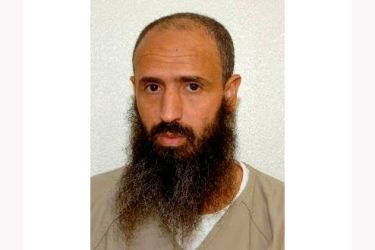Biden administration transfers first detainee from Guantanamo
Moroccan prisoner Abdul Latif Nasser had been held by the US since 2002 without being charged with a crime.

The United States has transferred a detainee out of the Guantanamo Bay detention facility for the first time since President Joe Biden took office, sending a Moroccan man back home years after he was recommended for discharge.
The Moroccan prisoner, Abdul Latif Nasser, who is in his mid-50s, was cleared for repatriation by a review board in July 2016 but remained at Guantanamo for the duration of the term of former President Donald Trump.
Keep reading
list of 3 itemsUS approves release of oldest prisoner at Guantanamo: Lawyer
Trump wanted to send COVID-infected Americans to Guantanamo: Book
The Periodic Review Board process determined that Nasser’s detention no longer remained necessary to protect US national security, the Pentagon said on Monday in a statement.
In 2016, the board recommended authorisation for Nasser’s repatriation, but the process could not be completed before the end of the administration of former President Barack Obama, who had made closing the controversial detention centre – long tarred by accusations of extra-legal imprisonment, denial of rights and torture – a priority of his presidency.
Obama’s attempts to close the facility were blocked by Republicans in Congress, who restricted the ability to transfer detainees to the US mainland.
Both Obama and his predecessor George W Bush supported the prisoner transfer process. However, that process largely stalled under Trump, who said before he took office that there should be no further releases from “Gitmo,” as Guantanamo Bay is often called.
“These are extremely dangerous people and should not be allowed back onto the battlefield,” he said then.
The transfer of Nasser could suggest President Biden is making efforts to reduce the Guantanamo population, which now stands at 39. At its peak, the complex housed about 800 detainees.
Biden’s White House in February launched a study into how to close the prison but has been careful not to overpromise after the failure of Obama’s pledge.
The American Civil Liberties Union celebrated Nasser’s transfer but called on the Biden administration to “urgently … negotiate and implement similar decisions for other cleared prisoners.
“Bringing an end to two decades of unjust and abusive military detention of Muslim men at Guantánamo is a human rights obligation and a national security necessity,” the ACLU said in a statement.
Held without charge
The US thanked Morocco for facilitating Nasser’s transfer back home.
“The United States commends the Kingdom of Morocco for its long-time partnership in securing both countries’ national security interests,” the Pentagon statement said.
“The United States is also extremely grateful for the Kingdom’s willingness to support ongoing US efforts to close the Guantanamo Bay Detention Facility.”
State Department spokesman Ned Price added in a statement, “Morocco’s leadership in facilitating Nasir’s repatriation, alongside its past willingness to return its foreign terrorist fighters from northeast Syria, should encourage other nations to repatriate their citizens who have traveled to fight for terrorist organizations abroad.”
Nasser’s journey to the prison in Cuba was a long one.
He was a member of a nonviolent but illegal Moroccan Sufi Islam group in the 1980s, according to his Pentagon file. In 1996, he was recruited to fight in Chechyna but ended up in Afghanistan, where he trained at an al-Qaeda camp.
He was captured after fighting US forces there and sent to Guantanamo in May 2002.
An unidentified military official appointed to represent him before the review board said he studied maths, computer science and English at Guantanamo, creating a 2,000-word Arabic-English dictionary.
The official told the board that Nasser “deeply regrets his actions of the past” and expressed confidence he would reintegrate in society.
The former detainee was never charged with a crime.